Israel’s Gaza genocide to build the Ben Gurion Canal
Israel’sGazaGenocideToBuildTheBenGurionCanal
-
Handy Easy Email and World News Links WebMail
GoogleSearch INLTV.co.uk YahooMail HotMail GMail - news.sky.com/watch-live New York Post nypost.com YouTube
- Well Funded Private Group Supported by Donald Trump and other Millionaires and Billionaires Are Preparing A Private Prosecution Against USA President Joe Biden, USA Secretary Antony Blinken and Israeli Prime Minister Benjamin for Various War Crimes Which Includes Conspiracy to Murder and injure over 70,000 innocent Palestinian Women and Children in Gaza and Westbank In Palestine
Israel’s Proposed Final Solution For The Palestinians V45 Nov 16 2023 Makia Freeman
Click Here for the best range of Amazon Computers
Click Here for INL News Amazon Best Seller Books
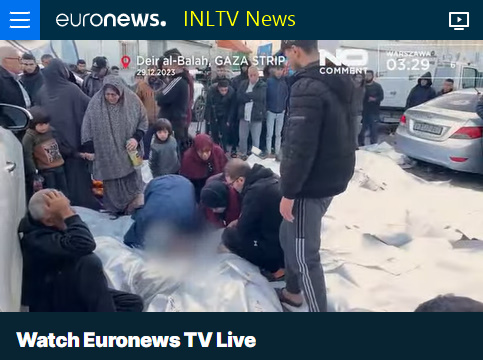
Israel's Genocide Of Palestinian People In Gaza
Euros News INLTV News
Israel's Genocide Of Palestinian People In Gaza 29th December 2023
Euros News INLTV News
The Ben Gurion Canal project
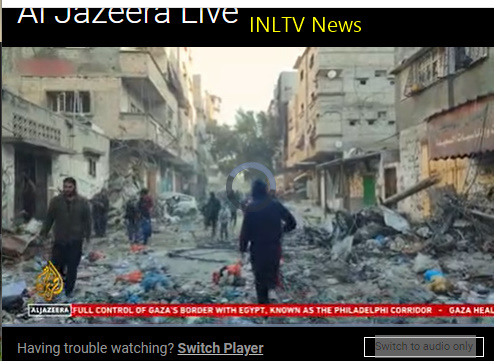
Israel Leveling Gaza In Preparation To Build Ben Gurion Canal
Euros News INLTV News
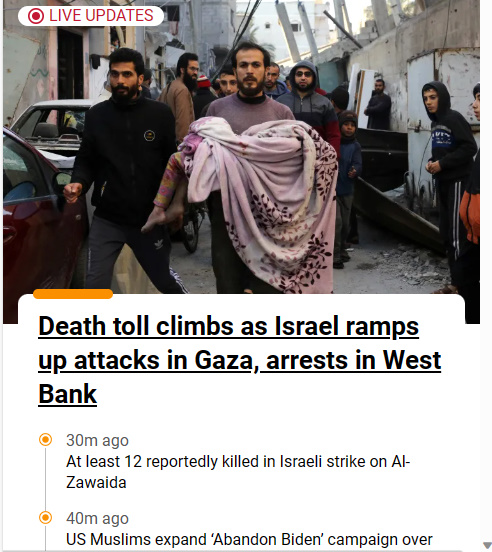
Israel Leveling Gaza In Preparation To Build Ben Gurion Canal
Euros News INLTV News
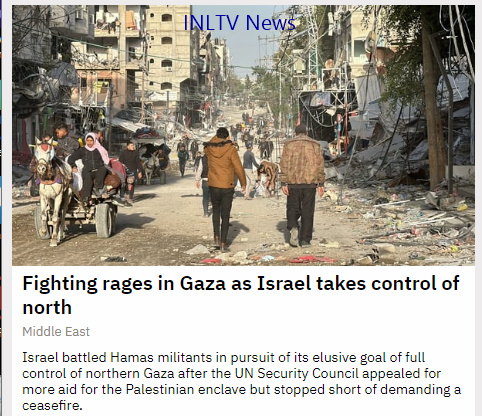
Israel Leveling Gaza In Preparation To Build Ben Gurion Canal
Euros News INLTV News

Israel Leveling Gaza In Preparation To Build Ben Gurion Canal
Euros News INLTV News
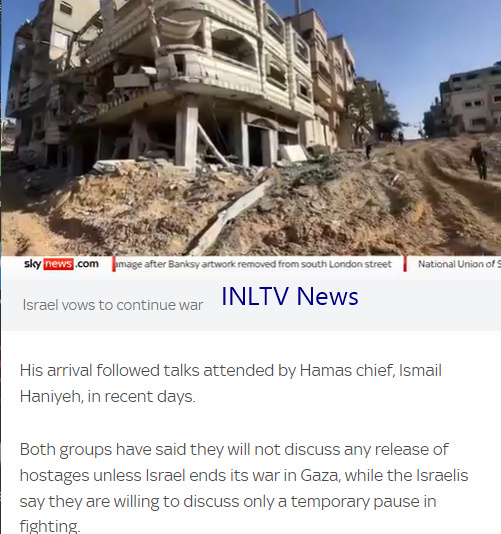
Israel Leveling Gaza In Preparation To Build Ben Gurion Canal
Euros News INLTV News
One of the original planned paths would go through the Arabah valley, cut west before the Dead Sea basin through the hills and curves north again to avoid the Gaza Strip
A competitor to the Suez Canal is being planned to cut across Israel and connect the Mediterranean Sea with the Red Sea.
This canal would give the U.S. and Israel control over a key chokepoint in the world for military ships, grain exports, energy and other commodities.
The planned route of the canal goes right through northern Gaza, and many analysts believe that Gaza is being destroyed and wiped out right now to make way for the construction of this canal, which would bring in billions of dollars a year for Israel (and grant Israel control over its access)
Israel's Ben Gurion Canal Biggest project in the world Explained by The Nikky
Northern Gaza Now Looks Like A Waist Land 24th December 2023 After Constant Bombing By Israel's RDF
Israel Wants to Seize Gaza to Build the Ben Gurion Canal a rival to Egypt’s Suez Canal
videos/
Why Gaza matters
The US had once proposed to use some 520 nuclear bombs on the Negev Desert (Naqab) to help create the canal. With Gaza razed to the ground, there have been alleged plans to literally cut corners and reduce costs by diverting the canal straight through the middle of the Palestinian enclave. However, the presence of Palestinians there would remain an obstacle.
Since Israel launched its onslaught on the besieged enclave, it has pushed Palestinians to move south by relentlessly bombing northern Gaza before carrying out a ground invasion weeks later. At least 400,000 Palestinians have been displaced from the north to the south, according to statistics from the Palestinian Central Bureau of Statistics (PCBS).
Some 800,000 Palestinians remained in areas considered "north" - namely past north of Wadi Gaza. Israel's indiscriminate bombing campaign, which has mostly targeted the north - has killed at least 11,470 people in Gaza - mostly civilians, including women and children.
The death toll has not been updated for days due to Israel's targeting of the largest hospital in Gaza, Al-Shifa, which was a centre for collecting data on deaths and the wounded.
Israel denies it has plans to annex the Strip but it had called for the "voluntary migration" of Palestinians in Gaza amid accusations that it was "ethnically cleansing" the enclave.
Israel wants to take control of the Philadelphi Corridor

The Philadelphi Route is located along the Egypt-Gaza border
Is this all part of Israel's long tern plan to build An alternative to the Suez Canal which seems central to Israel’s genocide of the Palestinians in Gaza?
https://www.newarab.com/news/what-israels-ben-gurion-canal-plan-and-why-gaza-matters
What is Israel's Ben Gurion canal plan and why Gaza matters
As Israel intensifies its Gaza onslaught, focus turns to the controversial Ben Gurion Canal Project, originally proposed in the 1960s as an alternative to the Suez Canal.
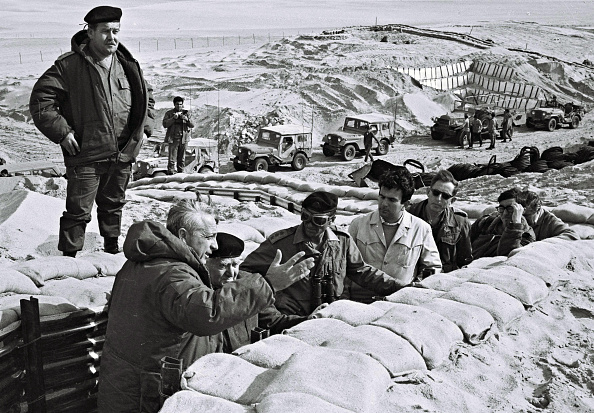
Ariel Sharon gestures as he briefs former Israeli Prime Minister David Ben Gurion in an army trench in 1971 near the Suez Canal
As Israel continues its onslaught on the besieged Gaza Strip, talks about a long-discussed economic opportunity known as the Ben Gurion Canal Project have surfaced online.
Named after Israel's founding father, David Ben-Gurion, the project, conceived in the late 1960s, sought to create an alternative route to the Suez Canal, the primary shipping route connecting Europe and Asia.
While Israel rejects calls for a ceasefire and its military campaign on Gaza shows no sign of an immediate end, it becomes crucial to delve into the historical context of the Ben Gurion Canal Project, its proposed significance, and the intricate geopolitics surrounding the Suez Canal.
Understanding the motivations behind the proposal requires exploring the complex history of the Suez Canal, the Tripartite Aggression of 1956, and the unexpected shocks to world trade resulting from its closures.
This backdrop underscores the potential strategic importance of an alternative canal, controlled by Israel, in the ever-evolving dynamics of the region.
The Philadelphi Route, also called Philadelphi Corridor, is a narrow strip of land, 14 km (8.699 miles) in length, situated along the entirety of the border between Gaza Strip and Egypt. Under the provisions of the Egypt–Israel peace treaty of 1979, it was established as a buffer zone controlled and patrolled by Israeli forces. One purpose of the Philadelphi Route was to prevent the movement of illegal materials (including weapons and ammunition) and people between Egypt and the Gaza Strip. Palestinians have built smuggling tunnels under the Philadelphi Route to move these into the Gaza Strip.
After the 1993 Oslo Accords, Israel was allowed to retain the security corridor. Following Israel's unilateral disengagement from the Gaza-strip in 2005, the Philadelphi Accord with Egypt was concluded, which authorized Egypt to deploy 750 border guards along the route to patrol the border on Egypt's side. The Palestinian side of the border was controlled by the Palestinian Authority, until the 2007 takeover by Hamas. The joint authority for the Rafah Border Crossing was transferred to the Palestinian Authority and Egypt for restricted passage by Palestinian ID card holders, and by others by exception
https://en.wikipedia.org/wiki/Philadelphi_Route
Who is Ben Gurion?
David Ben-Gurion (1886–1973) was a prominent Zionist leader from Poland, who was known as the founding father of Israel.
He was described as a ruthless man who gave orders to Zionist militias to see the mass explosion of Palestinians from their lands and facilitated the influx of Jewish immigrants from all over the world into Palestine. He served as the first prime minister of Israel in 1948.
What is the Ben Gurion Canal project?
The Ben Gurion Canal project was a proposal in the 1960s by Israel to connect the Red Sea to the Mediterranean Sea through the southern end of the Gulf of Aqaba. The route was planned via the port city of Eilat and the Jordanian border, through the Arabah Valley for about 100 kilometres between the Negev (Naqab) Mountains and the Jordanian Highlands and veered west before the Dead Sea basin, and heading through a valley in the Negev Mountain (Naqab) Range. It would then head north again to circumvent the Gaza Strip and connect to the Mediterranean Sea.
However, a connection between the Red Sea and the Mediterranean Sea already exists through the Suez Canal - an artificial sea-level waterway in Egypt that offers vessels a direct route between the North Atlantic and the northern Indian oceans, reducing journey distance and time.
The Suez Canal provides the shortest sea route between Asia and Europe and currently handles roughly 12 percent of the world's trade.
Why did Israel propose the project?
The Constantinople International Convention - signed in 1888 by the great European powers of the era - once guaranteed a right of passage via the Suez Canal to all ships during times of war and peace.
However, after the Suez Canal was nationalised in 1956 by then-Egyptian President Gamal Abdel Nasser, Egypt closed off access to the canal on several occasions following the establishment of Israel in 1948 and the violent displacement of Palestinians, also known as the Nakba.
Egypt blocked Israeli vessels from accessing the canal from 1948 until 1950, affecting its ability to trade with East Africa and Asia, and hampering its ability to import oil from the Gulf region.
Access to the Suez Canal was closed to all international shipping in 1956, following the Tripartite Aggression against Egypt, which involved an alliance between Israel, the UK and France who sought to regain control of the Suez Canal and remove Nasser from power.
The canal was effectively closed during the conflict, and the situation escalated into a crisis with international and economic ramifications.
The Suez Canal was also closed for a staggering eight-year period in 1967, at the beginning of the Six-Day War, also known as the Arab–Israeli War, which was fought between Israel and a coalition of Arab states (primarily Egypt, Syria, and Jordan).
When all land trade routes were blocked by Arab states, Israel's ability to trade with East Africa and Asia, mainly to import oil from the Persian Gulf, was also severely hampered.
The closure of the canal was also a significant and unexpected shock to world trade and disrupted global commerce.
An alternative to the Suez Canal, especially one under the authority of key Western ally Israel, would eliminate the potential use of the Suez Canal and the Straits of Tiran as leverage by Egypt against Israel or its allies.
Economic gains
The Suez Canal has been critical in driving Egypt’s economy forward. It earns revenues through tolls and transit fees collected from vessels that pass through the canal.
In 2021, some 20,649 vessels flowed through the Suez Canal - an increase of 10 percent over 2020. In 2022, annual revenue stood at $8 billion in transit fees. The Suez Canal set a new record with an annual revenue of $9.4 billion for the fiscal year that ended 30 June 2023.
While the canal is Egypt's economic centrepiece, attracting investments to the country and leading to the development of services and industries, its primary importance remains to be its ability to facilitate international trade, making an efficient global trade route.
The Ben Gurion Canal, if constructed, would rival the Suez Canal and cause a major financial threat to Egypt.
If it goes ahead, it would be almost one-third longer than the current 193.3km Suez Canal, and whoever controls it will have enormous influence over the global supply routes for oil, grain, and shipping.
The Ben Gurion Canal project
One of the original planned paths would go through the Arabah valley, cut west before the Dead Sea basin through the hills and curves north again to avoid the Gaza Strip
Why Gaza matters
The US had once proposed to use some 520 nuclear bombs on the Negev Desert (Naqab) to help create the canal. With Gaza razed to the ground, there have been alleged plans to literally cut corners and reduce costs by diverting the canal straight through the middle of the Palestinian enclave. However, the presence of Palestinians there would remain an obstacle.
Since Israel launched its onslaught on the besieged enclave, it has pushed Palestinians to move south by relentlessly bombing northern Gaza before carrying out a ground invasion weeks later. At least 400,000 Palestinians have been displaced from the north to the south, according to statistics from the Palestinian Central Bureau of Statistics (PCBS).
Some 800,000 Palestinians remained in areas considered "north" - namely past north of Wadi Gaza. Israel's indiscriminate bombing campaign, which has mostly targeted the north - has killed at least 11,470 people in Gaza - mostly civilians, including women and children.
The death toll has not been updated for days due to Israel's targeting of the largest hospital in Gaza, Al-Shifa, which was a centre for collecting data on deaths and the wounded.
Israel denies it has plans to annex the Strip but it had called for the "voluntary migration" of Palestinians in Gaza amid accusations that it was "ethnically cleansing" the enclave.
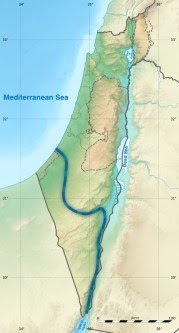
|
Gaza being exterminated to make way for lucrative Ben Gurion canal that will cut across Israel to the Red Sea Natural News Report and Podcast Mike Adam |
|
|
A competitor to the Suez Canal is being planned to cut across Israel and connect the Mediterranean Sea with the Red Sea. This canal would give the U.S. and Israel control over a key chokepoint in the world for military ships, grain exports, energy and other commodities. The planned route of the canal goes right through northern Gaza, and many analysts believe that Gaza is being destroyed and wiped out right now to make way for the construction of this canal, which would bring in billions of dollars a year for Israel (and grant Israel control over its access). |
|
An alternative to the Suez Canal is central to Israel’s genocide of the Palestinians
![A "Welcome to Egypt" sign can be seen across the Suez Canal on 30 March 2021 in Ismailia, Egypt. [Mahmoud Khaled/Getty Images]](https://ci6.googleusercontent.com/proxy/AhhhcCK57L-cXqFoFCnEQRbpJRVWu8nuDtZL_KHLITg82P5deqONgBG4ZAH3gTrWE41UHImF1RZVffbrb4pkKssiKcHPhwkw-FP8pIskxyCeQS0MWalh7d1d9DnQXcJFW3qmhYmTPqIIk0kM7OgL_R-7QX5nSvtFLJ43eXdLzMJz9vaBIa0RfTsG6eCrbs5trkF4s8AX44MPHnlLDg2A2wdTZhUxLVO1sen7LiA=s0-d-e1-ft#https://i0-wp-com.cdn.ampproject.org/i/s/i0.wp.com/www.middleeastmonitor.com/wp-content/uploads/2021/04/GettyImages-1232019401-1.jpg?fit=1200%2C800&ssl=1)
I hate conspiracy theories and fake news. They degrade my profession as a journalist and incite fear, hate and tribulation with the deliberate intention of causing a public backlash. Naturally, there have been all sorts of speculation and rumour around the war in Gaza and the 7 October surprise Hamas attack on the occupation state.
It has been said that the attack was two years in the planning in Gaza, a tiny patch of land riddled with Zionist infiltrators and spies who cajole, bribe and threaten ordinary Palestinians to betray their comrades.
So the question many are asking, with some justification, is why there was such a catastrophic intelligence failure which meant that the attack caught the Israeli military sleeping on the job. In terms of access to eavesdropping technology and defence there is probably no better-equipped military in the world other than in the US, and the Americans maintain secret supply bases in the Zionist state. Israel’s Mossad has earned itself a reputation of being among the finest intelligence gatherers and infiltrators in the world. And yet 7 October saw Hamas fighters breach security fences, invade a music festival and local kibbutzim, and fly in on paragliders without a single challenge. How did this happen?
Some of Israel’s most brutal attacks on innocent Palestinians are made citing “national security” and Israel’s alleged right to defend itself. If it was being attacked by another nation state, fair enough. But an attack by people living under Israel’s brutal military occupation provides no such legal defence. It doesn’t exist.
READ: 41 children killed in West Bank since 7 October, charity says
A good contact and friend of mine who watches the region’s events closely told me simply: “Follow the money.” And that is how, after being nudged and pointed in a variety of directions with annoyingly vague clues, I found myself pouring over a network of paper trails that led to the National Archives, where British secrets lie unseen for at least 30 years and in some cases much, much longer.
By the time they surface, it’s usually far too late to do anything as the guilty have taken their secrets to the grave, but some disclosures do explain the terrible behaviour of governments and rogue politicians. Many of my colleagues are waiting with bated breath for the March 2030 deadline to pass to find out how the Iraq war came about, and if our suspicions about former British Prime Minister Tony Blair’s role are as bad as we believe.

The Ben Gurion Canal Project
This particular paper chase, though, took me to the origins of the Suez Canal, which opened with a grand ceremony on 17 November 1869, 154 years ago this month. Today, 10 per cent of the world’s cargo ships sail through this strategic route between the Eastern Mediterranean and the Red Sea, heading to and from the Indian Ocean and connecting Europe and Asia.
Egypt owns, controls and operates the canal now, but it was once owned by French investors who held half of the canal company’s stock with Egypt’s ruler Sa’id Pasha holding most of the balance. In 1875, a cash crisis forced Sa’id’s successor, Isma’il Pasha, to sell the country’s shares to Britain. The Suez Company operated the canal until Egypt’s President Gamal Abdel Nasser tore up the concession in 1956 and transferred the canal’s operation to the state-owned Suez Canal Authority. There then followed the Suez Crisis, also known as the second Arab-Israeli war.
On the same day that the canal was nationalised Nasser also closed the Straits of Tiran to all Israeli ships. The crisis saw the UK, France, and Israel invade Egypt. According to pre-agreed plans prepared by Britain and France, Israel invaded Egypt’s Sinai Peninsula on 29 October 1956, forcing the Egyptians to engage its troops. This gave the excuse for the Anglo-French alliance to declare the fighting to be a threat to stability in the Middle East and enter the war, officially to separate the two forces but, in reality, to regain control of the Suez Canal and bring down the Nasser government.
What does it have to do with 7 October 2023? Well, it just so happens that Gaza is slap bang in the middle of the proposed path of a major second canal in the region.
READ: Only 27% of Israelis believe Netanyahu is suitable to head government
Gaza is currently being bombed to oblivion by the deranged Israeli leader Benjamin Netanyahu who wants to deliver The Ben Gurion Canal Project. Yes, Tel Aviv already has a name for the canal which was first proposed back in the Sixties. It would connect the Gulf of Aqaba on the Red Sea to the Mediterranean Sea, and would even be named after the first prime minister of Israel.
The canal would rival Egypt’s Suez Canal, causing a major financial threat to the country and this major trade artery. Remember the global trade disaster caused the huge container ship Ever Given got stuck in the famous canal in 2021? The Straits of Tiran and Suez Canal remained formally closed to Israeli vessels from the creation of Israel in 1948 and the Nakba until the Suez Crisis in 1956. When all land trade routes were blocked by Arab states, Israel’s ability to trade with East Africa and Asia, mainly to import oil from the Persian Gulf, was severely hampered. There have been other obstructions involving Israel forcing its closure in 1956-7 and 1967-75.
If it goes ahead, this new canal will be almost one-third longer than the 193.3 km Suez Canal, at around 292.9 km and an estimated cost of between $16 and $55 billion. Whoever controls the canal will have enormous influence over the global supply routes for oil, grain and shipping. With Gaza razed to the ground, it would enable the canal planners to literally cut corners and reduce costs by diverting the canal straight through the middle of the territory.
Around 12 per cent of the world’s trade passes through Suez on 18,000 ships a year, so you can imagine that a lot of countries will be lining up for a share of the deal. The Suez Canal is worth a staggering $9.4 billion to Egypt, which has enjoyed record-breaking revenues this year.
The only thing stopping the newly-revised project from being revived and rubber-stamped is the presence of the Palestinians in Gaza. As far as Netanyahu is concerned they are standing in the way of the project; a project which may earn him forgiveness in Tel Aviv for the intelligence and military shortcomings on 7 October. However, his treacherous sleight of hand will never by forgiven or forgotten by the people of Palestine given the horrors which have descended upon Gaza in the past few weeks.
READ: No evidence of Hamas seizing aid entering Gaza: US envoy
If this is all being done in the name of potential business deals then it compounds the political and diplomatic disgrace of the shameless Western governments who are complicit in the Palestinian genocide.
The biggest shame, though, belongs to Egypt. Already on the verge of bankruptcy due to President Abdel Fattah Al-Sisi’s profligacy, the emergence of a new canal would have a devastating impact on the Egyptian economy and its people. Heartless dictator Al-Sisi may come to regret putting his trust in Tel Aviv and Western governments above the interests and welfare of two million Palestinians in Gaza.
None of the Middle East leaders, Netanyahu, Biden and Sunak et al in the West emerge from the carnage in Gaza with any degree of integrity intact. Together, they are guilty of war crimes and crimes against humanity, or at the very least are complicit in such awful crimes leading to genocide.
This didn’t all begin on 7 October; the bombing of Gaza is simply the latest stage of Israel’s slow genocide of the people of Palestine, which has now got up to speed again with the full backing of the Western sponsors of the apartheid state. If they think that killing innocent children and women will bring peace, they are deluded.
Unbridled neoliberal capitalism has destroyed many countries and killed millions of people, and peace and security have rarely been the result. I hope that the evil people responsible will burn in Hell for what they have done to the children of Palestine, Iraq, Afghanistan, Libya, Syria and numerous other countries around the world. The survivors need freedom and justice now.
OPINION: Like the fabled phoenix, Gaza will rise from the ashes
The views expressed in this article belong to the author and do not necessarily reflect the editorial policy of Middle East Monitor.





